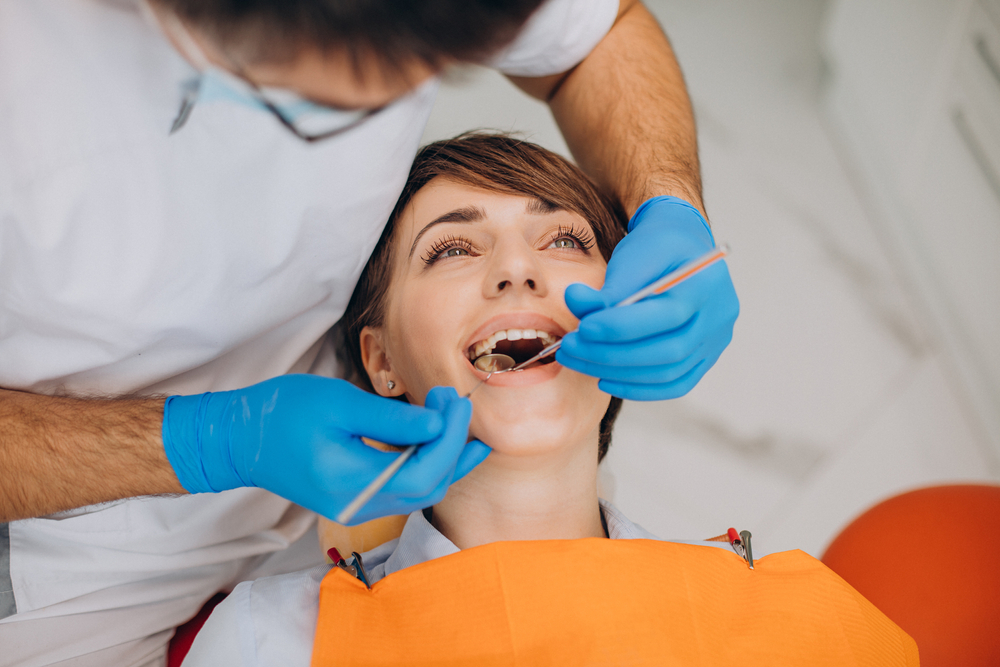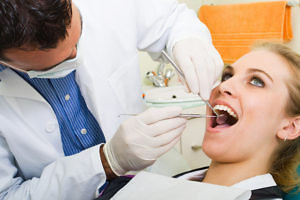Important check-ups and hygiene visits
A check-up allows your dentist to see if you have any dental problems and helps you keep your mouth healthy. If problems are left untreated, it could make them more difficult to treat in the future. It is therefore best to deal with problems early, or, if possible, prevent them altogether. A dental check-up or examination usually takes less than 30 minutes for routine check-ups and around 45 minutes to 1 hour for new patients.
Your dentist can carry out a thorough dental examination to check the health of your gums, which may involve inserting a thin metal stick with a bend in one end (periodontal probe) beside your teeth. Most adults in the UK have gum disease to some degree and most people experience it at least once. It’s much less common in children. Gum disease is caused by a build-up of plaque on the teeth. Plaque is a sticky substance that contains bacteria. Some bacteria in plaque are harmless, but some are harmful for the health of your gums. If you don’t remove plaque from your teeth by brushing them, it builds up and irritates your gums.
If you have gum disease, your gums may bleed when you brush your teeth and you may have bad breath. This early stage of gum disease is known as gingivitis. If gingivitis isn’t treated, a condition called periodontitis can develop. This affects more tissues that support teeth and hold them in place. If periodontitis isn’t treated, the bone in your jaw may be damaged and small spaces can open up between the gum and teeth. Your teeth can become loose and may eventually fall out.
Mild cases of gum disease can usually be treated by maintaining a good level of oral hygiene. This includes brushing your teeth at least twice a day and flossing regularly. You should also make sure you attend regular dental check-ups.
In most cases, your dentist or dental hygienist will be able to give your teeth a thorough clean and remove any hardened plaque (tartar). They’ll also be able to show you how to clean your teeth effectively to help prevent plaque building up in the future.
If you have severe gum disease, you’ll usually need to have further medical and dental treatment and, in some cases, surgery may need to be carried out. This will usually be performed by a specialist in gum problems (periodontics).
If you have untreated gum disease that develops into periodontitis, it can lead to further complications, such as:
- Gum abscesses (painful collections of pus)
- receding gums
- loose teeth
- loss of teeth
Diet and erosion and decay

Everybody has a certain amount of bacteria in their mouth, good bacteria, and not so good bacteria. Every time we eat or drink, the sugars in the food reacts with the bacteria, causing what’s called an ‘acid attack’. The acid attack lasts up to an hour, so in this time your teeth are most vulnerable. The more acidic foods and drinks you eat, the more your teeth are at risk of getting cavities. We always advise to cut your acid/sweet foods down to meal times. You may ask why, the reason is, when you eat your meals, your teeth are naturally under attack, so if you want to eat sweets or fizzy drinks, it’s better to eat them with your meals, to cut down the frequency of the attacks.
Bacteria is plaque. Plaque is made from your saliva, food and sugar particles. It’s a sticky film which lays on all surfaces of your teeth. Plaque can be removed with a toothbrush, plaque also forms in-between the teeth, and this is why your dentist may recommend you using dental floss, or interdental aids. This is because your toothbrush cannot reach small areas in-between your teeth to remove the plaque.
If the plaque is not removed, its starts to form a hard layer, called calculus. Calculus cannot be removed with home aids such as a tooth brushing or flossing, so you will need to take a visit to your dentist, or dental hygienist, who will remove the hard calculus with special dental instruments. If the calculus is not removed, the calculus then eats away at the tooth’s supporting tissues, then creating tooth mobility.
How best to clean teeth
Brush your teeth for approximately two minutes last thing at night before you go to bed and on one other occasion every day. It doesn’t matter whether you use an electric or manual toothbrush, just as long as you brush all the surfaces of all your teeth. Remember to brush the inside surfaces, outside surfaces and the chewing surfaces of your teeth.
Some people find it easier to clean their teeth thoroughly with an electric toothbrush. If you’re using an electric brush, one with an oscillating or rotating head may work better than a manual toothbrush.
It’s important to use toothpaste with the right concentration of fluoride.
- Adults – use toothpaste that contains at least 1,350 parts per million (ppm) fluoride.
- Children – don’t need to use special “children’s toothpaste”. Children of all ages can use family toothpaste, as long as it contains 1,350-1,500ppm fluoride. Children aged six and under who don’t have tooth decay can use a lower-strength children’s toothpaste, but make sure it contains at least 1,000ppm fluoride.
- Below the age of three, children should use just a smear of toothpaste. Children aged three to six years should use a pea-sized blob of toothpaste. Children need to be helped or supervised brushing their teeth until they’re at least seven years old.
After brushing, spit out any excess toothpaste. Do not rinse your mouth after brushing, as it will wash away the concentrated fluoride reducing its preventative effects. This will also happen if use mouthwash immediately after brushing. Choose a different time to use mouthwash, such as after lunch. Don’t eat or drink for 30 minutes after using a fluoride mouthwash.
Flossing isn’t just for dislodging food wedged between your teeth. Regular flossing may also reduce gum disease and bad breath by removing plaque that forms along the gum line. It’s best to floss before brushing your teeth.
You can use interdental brushes instead of flossing, especially if there are gaps between your teeth. The brush should fit snugly between the teeth.
Your dentist or hygienist can advise you on the best way to use interdental cleaning for your teeth.
Veneers
Looking after veneers is relatively simple.
- Brush and floss as you normally would to prevent dental problems. A good home care regimen will insure the aesthetic success of your veneers for years to come.
- If you are known to be a bruxer or clencher, i.e. you have a habit of grinding your teeth, please let your dentist know. He or she will provide you with a bite guard for you to wear to minimize the stresses placed upon your teeth while you sleep.
- Regular maintenance and dental check-ups are recommended so that your veneers and oral health can be reviewed periodically.
Bridge/ crowns
It is important to keep the crown just as clean as you would your natural teeth. The crown itself cannot decay, but decay can start where the edge of the crown joins the tooth. Brush last thing at night and at least one other time during the day with a fluoride toothpaste, and clean in between your teeth with ‘interdental’ brushes or floss.
Your new bridge will probably be made of porcelain as this is the most natural – yet also durable – material and it should last 10-15 years as long as you look after it properly. You should clean your dental bridge twice every day, just as you would your normal teeth. This will ensure that food debris is removed and will stop bacteria from building up around it. Super flossing will help too and is recommended by dentists. Your dentist will be able to demonstrate to you how best to clean and look after your dental bridge.
Implants
You care for your implants the same way you care for your natural teeth. It is important to brush and floss daily. If you have any problems, see your dentist before your six- month recall visit. Regular hygenists visits are essential.
Dentures
Keeping your mouth clean is just as important when you wear dentures. You should brush your remaining teeth, gums and tongue every morning and evening with fluoride toothpaste to prevent tooth decay, gum disease and other dental problems.
It’s important to regularly remove plaque and food deposits from your dentures, because unclean dentures can also lead to problems, such as bad breath, gum disease, tooth decay and oral thrush.
Clean your dentures as often as you would normal teeth (at least twice a day – every morning and night). You should:
- brush your dentures with toothpaste or soap and water before soaking them to remove food particles
- soak them in a fizzy solution of denture-cleaning tablets to remove stains and bacteria (follow the manufacturer’s instructions)
- brush them again, as you would your normal teeth (but don’t scrub them too hard)
Dentures may break if you drop them, so you should clean them over a bowl or sink filled with water, or something soft such as a folded towel.
Perfect Smile Spa based in Hornchurch Essex is a Leading Cosmetic Dentistry practice and is dedicated to PAINLESS dentistry.
Call us for a free consultation on 01708 442 114 or email care@perfectsmilespa.co.ukHow To Look Your Best Look After Your Smile was last modified: June 29th, 2018 by Dr Jas Sagoo




 132a High Street
132a High Street 01708442114
01708442114  care@perfectsmilespa.co.uk
care@perfectsmilespa.co.uk


